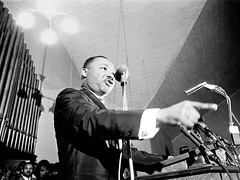Eyes On The Prize and Copyright Law

Have you wondered why PBS hasn't shown the documentary series Eyes On the Prize in such a long time? They can't-- at least not legally, as things stand.
from Wired News,"disappearing history":
Eyes on the Prize, which debuted on PBS in 1987, can no longer be broadcast on television and has never been released on DVD due to a tangle of licensing issues. When the film was first made, each piece of newsreel footage, photograph and song used in the 14-part series had to be licensed from its copyright holder. Due to limited funding, the filmmakers could only afford to buy rights to the material for a certain number of years, and now those rights have expired.
The unavailability of Eyes on the Prize prompted activist group Downhill Battle to organize screenings of the film across the country. About 100 screenings were planned for Tuesday[Feb 8th] in honor of Black History Month, according to the group.
In Berkeley, Eyes on the Prize: Awakenings, covering 1954 to 1956, was screened on a large PC monitor to the rapt attention of everyone squeezed into the living room. The film covered significant events in the beginning of the civil rights movement like the murder of Emmett Till and the Montgomery bus boycott.
"The events, images, narratives and songs of Eyes on the Prize were not written, created or performed by the corporations who now have the copyrights under their lock and key," said Bruce Hartford, reading from a statement signed by the 20-plus members of the Bay Area Veterans of the Civil Rights Movement group.
"These folks are burying our history," said Jelinek, who spent three years in the South working for the Student Nonviolent Coordinating Committee, spending some of that time ducking gunfire. "Copyright law was never meant to interfere with the public's right to know. We expected that the experiences would be in the public domain....
Before the film, Hunt read a portion of Article 1, Section 8 of the U.S. Constitution, which gives authors and inventors ownership rights for a limited time "to promote the progress of science and useful arts." Then he gave a brief overview of how the length of copyright ownership has been extended many times over, making it difficult for documentary filmmakers to "do history."
... Wazir Peacock, whose father worked on a cotton plantation as a sharecropper, talked about how he gave up a career in medicine to work in the Mississippi Delta registering blacks to vote. Peacock said he got involved in the civil rights movement after being outraged that grown black men were still treated like little boys by racist southern whites.
"It hurt me to my very soul," Peacock said.
Jimmy Rogers became involved in the movement while he was a student at Tuskegee Institute (now Tuskegee University). He described witnessing the murder of white seminarian Jonathan Daniels in Alabama. Daniels' murderer was acquitted. He also worked alongside Sam Young, another student at Tuskegee involved in the civil rights movement, who was murdered at a gas station.
Blackside and other filmmakers who lent their talents to Eyes on the Prize are currently working to assess the costs of re-clearing rights. An estimate of such costs is expected within weeks. Blackside's attorney said the company wants to make the series available again.
One of the reasons I felt less enthusiasm for Clinton in 1996 was the then-impending copyright reforms that were already being talked about as yet another proof of how Clinton was a "different" kind of democrat who would work with business to "modernize" copyright laws. Don't get me wrong, I think we were still better off with Clinton than Dole, but the digital millenium copyright act, passed just before the 1998 mid-term elections, is a nasty piece of work. It upped the max penalty for copyright infringement to 10 years in prison and a cool million dollar fine, and helped put commercial indie radio out of business. In addition, lawmakers passed the Sonny Bono Copyright Term Extension Act which extended copyright terms substantially. (Many at the time felt this was more properly called the Mickey Mouse Copyright Term Extension Act,as the mouse was getting ready to pass into the public domain and the Walt Disney Co. was understandably alarmed.)
Works created after 1/1/1978 - life of the longest surviving author plus 70 years - earliest possible PD date is 1/1/2048
Works registered before 1/1/1978 - 95 years from the date copyright was secured.
Works registered before 1/1/1923 - Copyright protection for 75 years has expired and these works are in the public domain.
Prior to the Sonny Bono 20 year copyright term extension, copyright protection for works registered before 1/1/1978 was 75 years; therefore, compositions registered in 1922 or earlier entered the public domain on 1/1/1998. The 1998 copyright extension did not extend copyright protection from 75 to 95 years for songs already in the public domain.
Now I couldn't care less about not being able to reproduce Mickey or Donald or any of their friends without Disney's permission. But the stranglehold that the (fewer and fewer) corporate media firms have on a huge portion of our recorded history (and effectively how we can talk about it) ticks me off to no end. Incidentally, the least expensive copy of Eyes on the Prize(1st set from '87) I could find was on Amazon for 375 bucks, albeit on laser disc. Alibris had a complete VHS set of the '87 show for six hundred dollars(!).
see also "Free Mickey Mouse", The Economist, 10 October 2002,by Lawrence Lessig.





<< Home